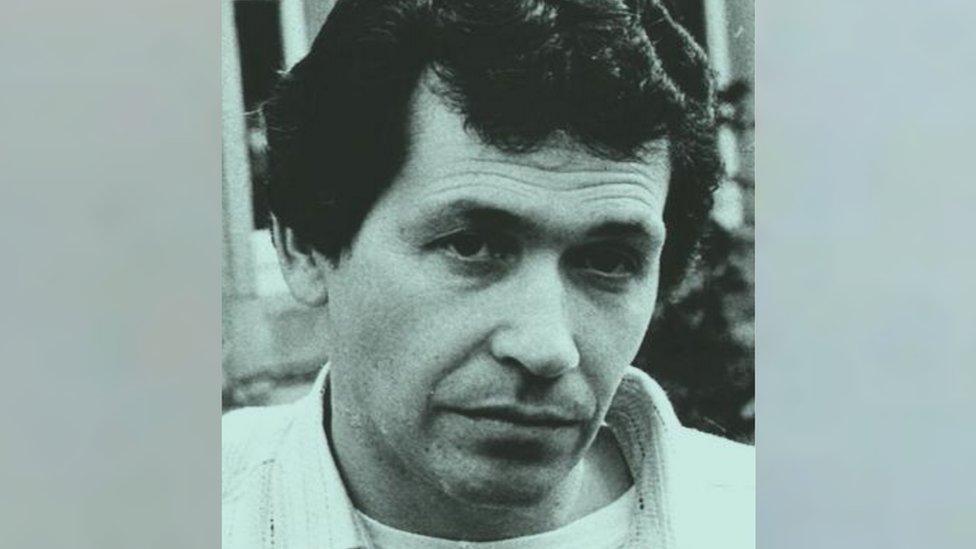The drama and farce of the Baker Street bank heist
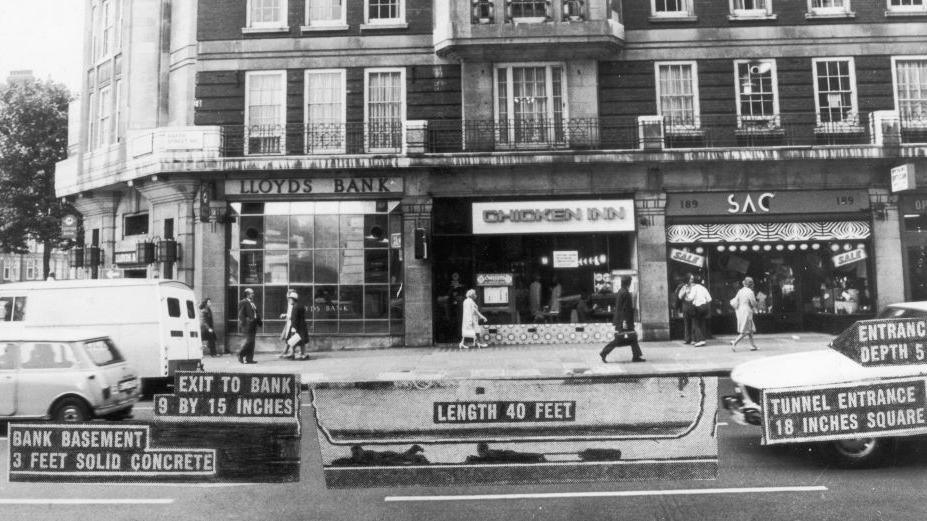
The tunnel into Lloyds Bank was described in court as "a remarkable piece of engineering"
- Published
In the autumn of 1971, a group of men came together who would carry out one of the most astonishing bank raids in history.
Skill, audacity and patience, criminal connections, a fair amount of luck, and inspiration from a Sherlock Holmes story culminated in a weekend of high drama and barely believable farce.
A weekend in which a gang tunnelled into a secure vault and made off with the contents of hundreds of secure deposit boxes, while all the time being listened to by an amateur radio operator who was trying to tune in to Radio Luxembourg.
A weekend in which police officers were on one side of the vault's door while the gang were on the other, and nobody thought to check inside.
As Lloyds Bank announces the upcoming closure of its Baker Street branch, external in central London, this is the story of how one of the most secure locations in the country was plundered - and even now, remains partly unsolved.
An archive news report from 1971, featuring a youthful John Humphrys
On a Friday night in September 1971, a group of men, clutching sandwiches and flasks of tea, made their way into SAC, a leather goods shop on Baker Street.
The previous May, the lease for the shop came up for sale and was duly bought by Benjamin Wolfe, a man in his 60s.
He had been especially keen on the premises because it was two doors down from Lloyds Bank and it had a basement the same depth as the bank's vault.
Before even that, in December 1970, an apparently well-to-do man opened an account at the Baker Street branch of Lloyds and put £500 (about £6,000 today) into it.
Later, he rented a safety deposit box at the branch.
Like many wealthy clients, he made frequent visits to his box in the vault.
Unlike many wealthy clients, he used the time to measure the room with his umbrella.
Other circumstances played into the hands of the group.
The summer had seen a number of roadworks in the area. The vibrations caused by the work led to businesses' trembler alarms repeatedly going off.
So the businesses disabled their trembler alarms.
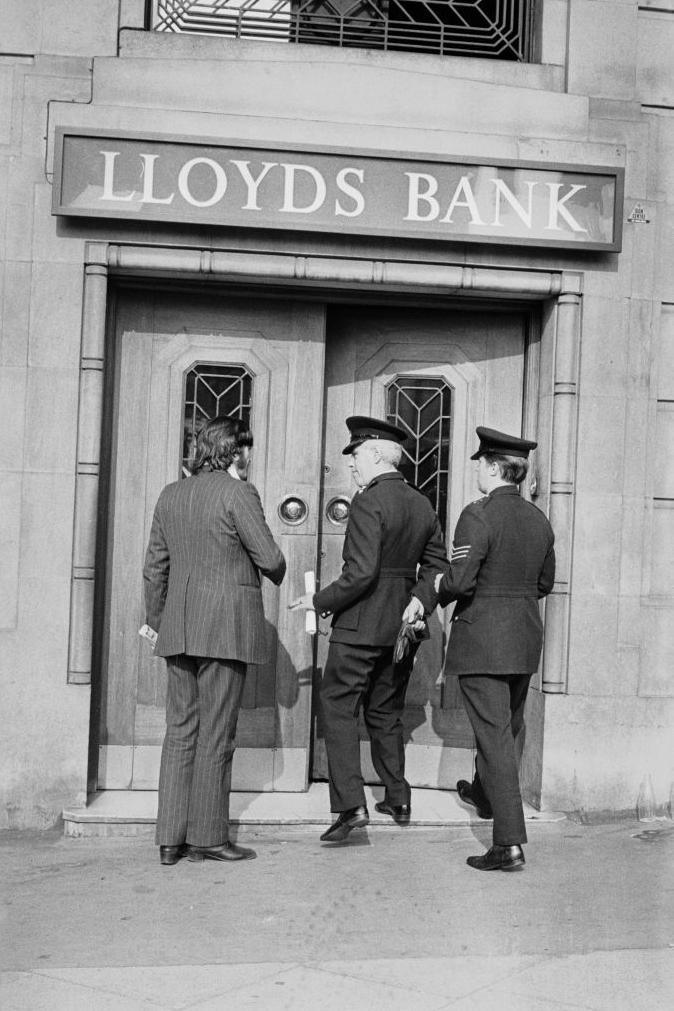
Detectives and uniformed officers went to inspect the interior of the bank after staff found the vault in a "state of some disorder"
Originally thought to have been organised by a Brian Reader, who was later involved in both the Brinks-Mat heist and the Hatton Garden raid, the personnel of the gang has never been fully established.
Reader, who died aged 84 last year with an estimated fortune of £22m garnered from his string of high-risk burglaries, denied he took part.
Four people, including Wolfe and Anthony Gavin, a protégé of Reader's, were jailed in 1973.
It's thought at least another four, including a woman, slipped away.
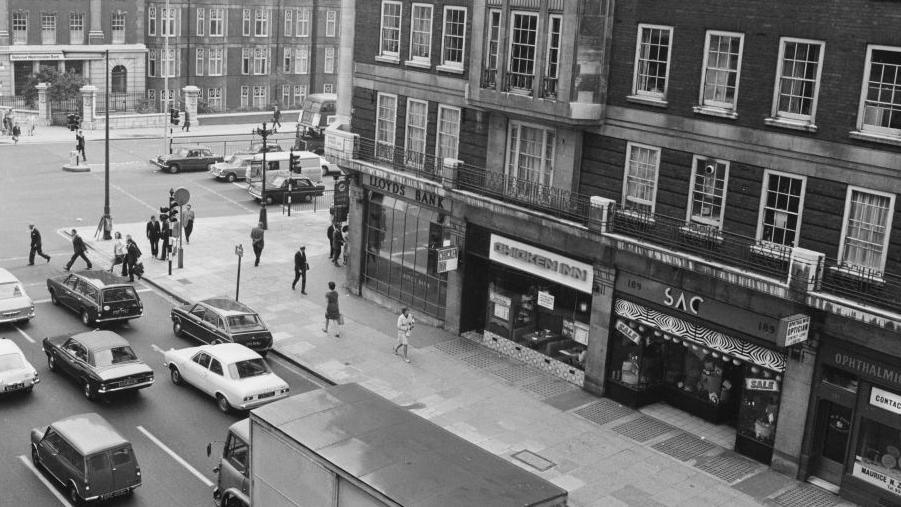
The lease of the leather goods shop SAC was bought by one of the gang
Other unanswered questions include how much was taken. It was reported that it could be anything between £500,000 and £3m (today's equivalent of £6m and £40m).
Only a fraction was recovered, and the rest went untracked.
There were rumours involving government suppression of the story, for reasons unknown.
And records about it officially sealed at the national archives, external until 2071.
And is there any truth to the claim that one box contained photographs of Princess Margaret in an intimate clinch?
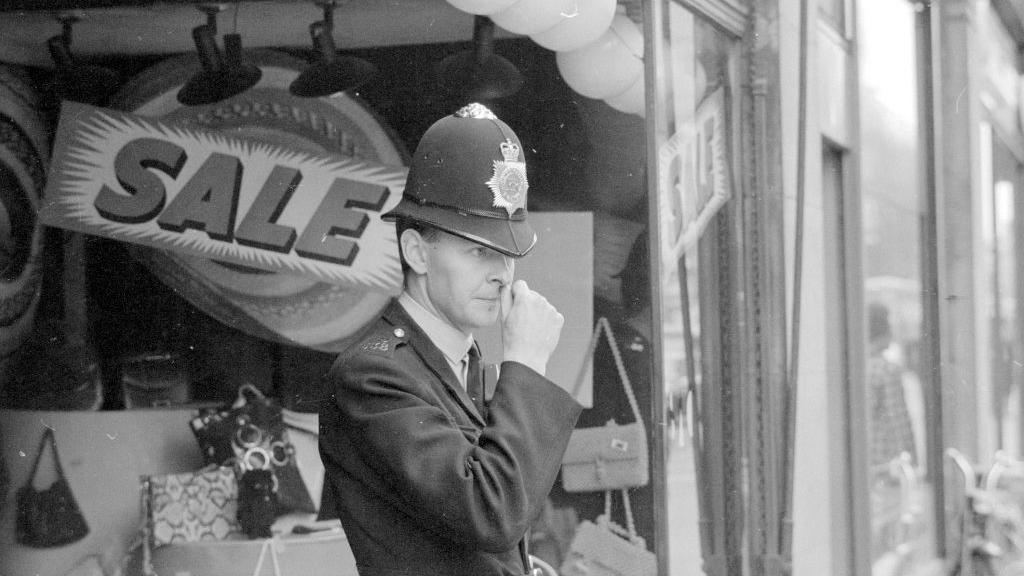
If police had looked into the leather goods shop on the night they were called out, they would have found a tunnel into the bank's vault
Gavin allegedly came up with the scheme after reading a Sherlock Holmes story, The Red-Headed League.
In it, Arthur Conan-Doyle's hero waits in a vault for burglars planning to tunnel in.
Alongside Wolfe, Gavin recruited Reginald Tucker (who was the umbrella-wielder) and Thomas Stephen.
Two others, Bobby Mills and Mickey Gervaise, were thought to be on board - although afterwards they disappeared into "thin air", the police investigation found.
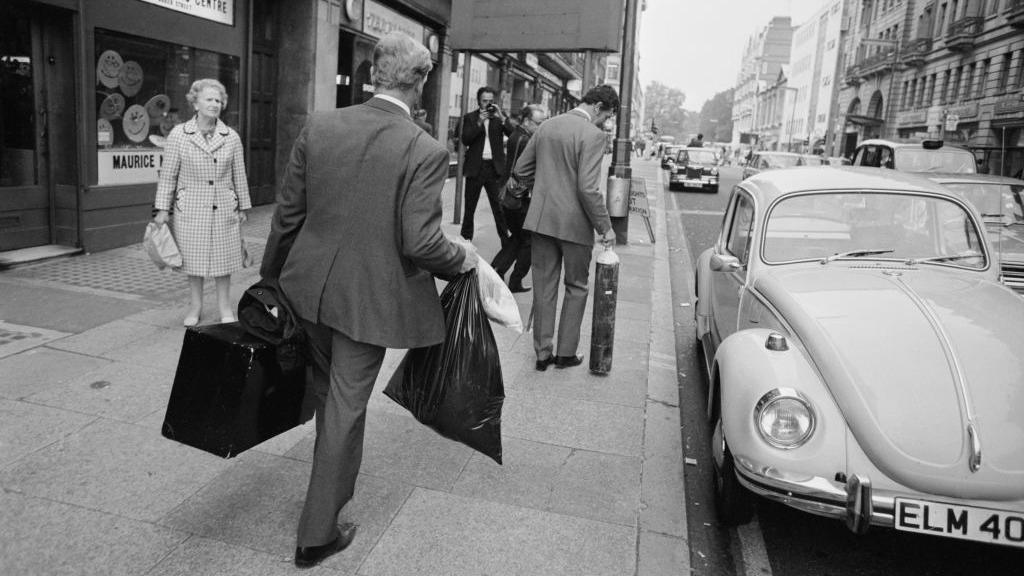
Police removed more than 800 items of evidence, a trial heard
Tea flasks and sandwiches were not the only items carted inside the leather shop.
Stephen, recruited for his ability to provide the necessary tools, had produced a 100-tonne jack, explosives, and a thermal lance, which heats and melts steel with pressurized oxygen to create very high temperatures.
Months of weekends were spent digging the 40ft tunnel, with debris being taken away in plastic boxes under cover of darkness.
When it was time for the raid, Mills, furnished with a walkie-talkie, mounted a nearby roof to keep an eye out as the others went through the tunnel and worked on breaking into the vault.
The jack didn't work, and nor did the thermal lance.
It would have to be the gelignite.
Timing the explosion to coincide with traffic to conceal the noise, they managed to break through.
They were in.
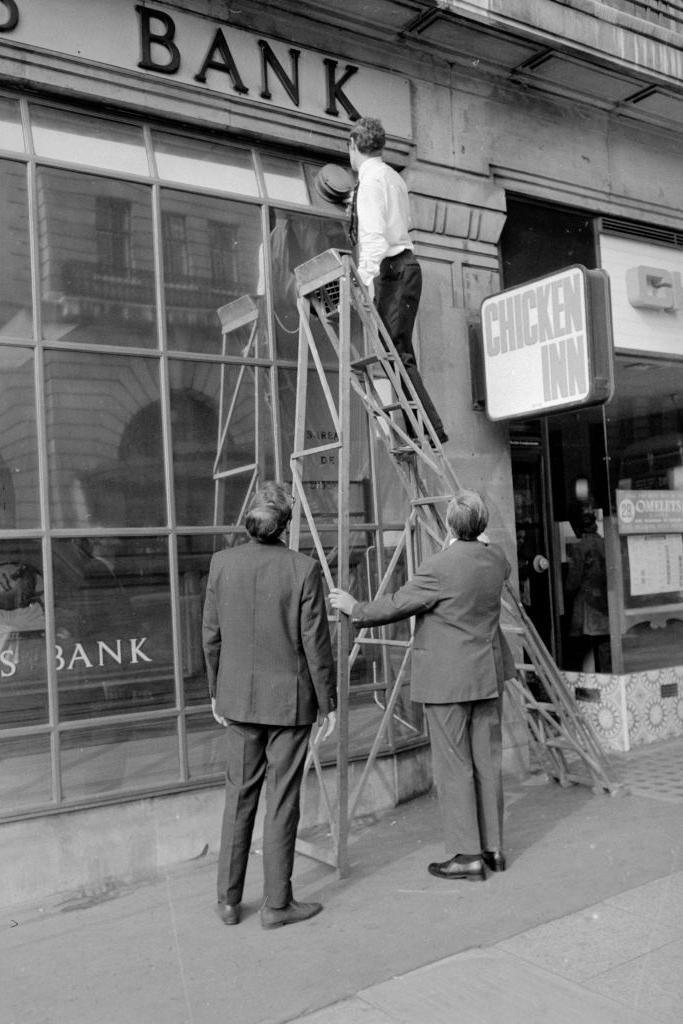
Police check the alarm that didn't sound as the burglars burrowed into the bank
Meanwhile, in his attempt to tune into Radio Luxembourg, Robert Rowlands was picking up the gang's walkie-talkie conversations on his ham radio.
The 35-year-old was listening to them in real time as they co-ordinated their movements and the rooftop lookout beefed about how cold he was.
Mr Rowlands heard the group discuss whether to take a break as their exploits had left the vault full of fumes, smoke and dust.
One tunneller requested a cup of tea and a sandwich.
They also mentioned how many "thousands" they had and what they would go back for.
Mr Rowlands assumed they were burgling a tobacco shop and the numbers referred to cigarettes.
Local police were not interested. A few hours later Mr Rowlands called Scotland Yard, where detectives were indeed interested.
They called in a detection van from the Post Office in an attempt to trace the walkie-talkie signal.
But they didn't do this until Sunday afternoon, when it was all over.
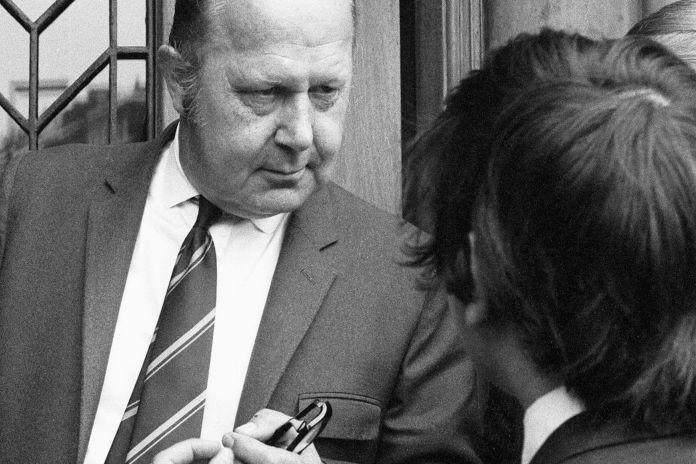
The bank manager, who was "roused from his bed" the previous night, explained to customers the branch was shut
The Times reported the following day: "Bank managers and caretakers were roused from their beds and brought from weekend holiday retreats to open their premises.
"Police, accompanied by security men, went into the bank, but after being assured that the strong room was intact, they left.
"As they closed the front door of the Lloyds premises, the thieves, some of them crouching behind the strong room doors, breathed a sigh of relief.
"The slightest gasp might have given away their position.
"Soon afterwards the thieves crawled back along the 40ft tunnel. They escaped through a back window leaving eight tons of rubble from the tunnel behind."
Or, as bank staff said, with remarkable understatement when they opened the branch on Monday morning: "We found the vault in some disorder."
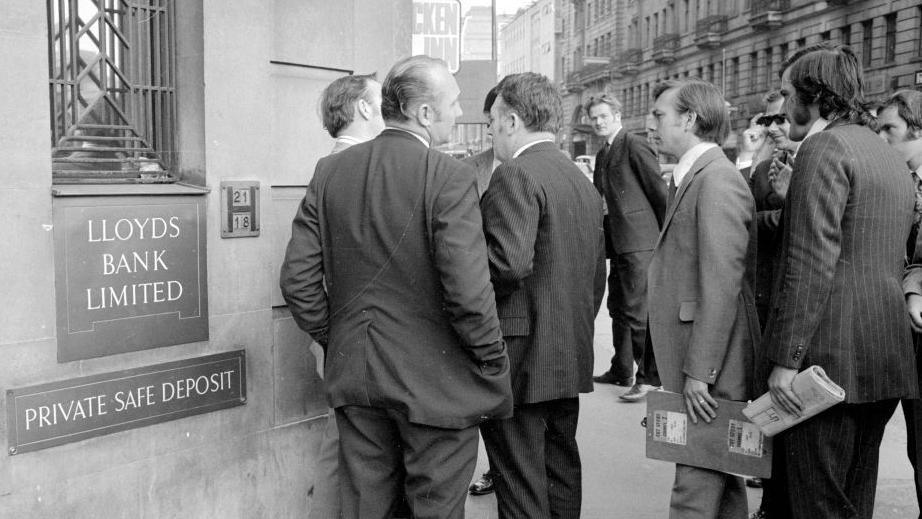
Police and news reporters gathered outside the branch on Baker Street
Cdr Robert Huntley, of Scotland Yard, said: "Inevitably, we have come in for some criticism, from people who say we were slow to move off the mark.
"When we were able to visit the bank with Lloyds security staff we were assured that the strong room was still intact. No one suspected that the gang had come up through the floor on the other side."
It was the biggest robbery ever carried out in the Metropolitan Police district, with 120 detectives working on the case.
"We are getting information about who are the real brains behind this gang", Cdr Hunt said.
"We think that the 'Mr Big' is probably a faceless commuter. I do not know him."
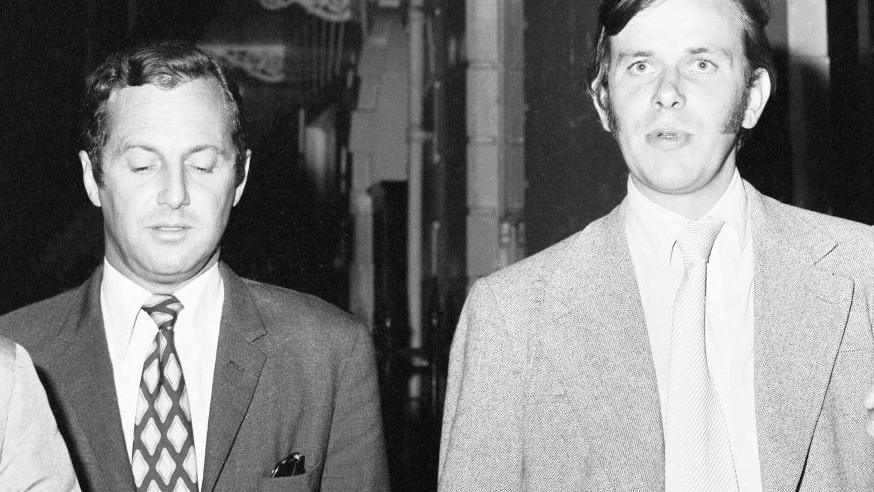
Robert Rowlands, left, raised the alarm after picking up the gang's walkie-talkie conversations on his ham radio
Gavin - whose tunnel-digging was described at the Old Bailey as "a magnificent piece of engineering" - Tucker and Stephen all pleaded guilty to entering the bank as a trespasser, stealing cash and jewellery and possessing explosives.
Wolfe was found guilty of the same charges.
Passing sentence, Judge Sutcliffe QC, said: "Each one of you must have known that the reward for success would be very high and the penalty for failure would be high as well."
Wolfe was given eight years in jail, while the others received 12.
Judge Sutcliffe told Wolfe he was passing a lesser sentence on him only because of his great age.
"I am not going to have on my conscience the sentencing of a man for so long that he has little chance of leaving prison alive."
(Wolfe was 64).
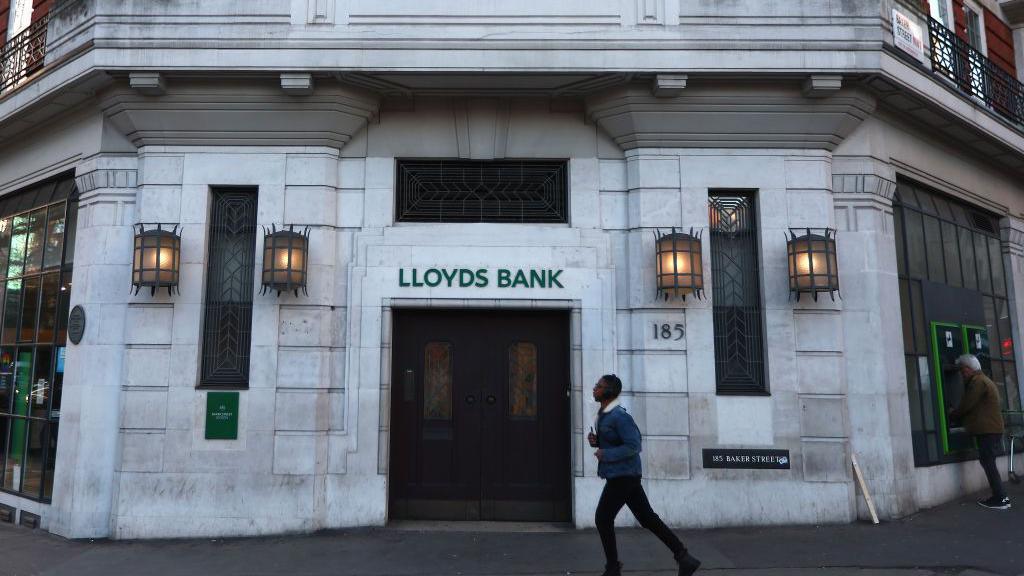
The bank will close on 6 January, Lloyds said
The aftermath of the case saw an undignified bout of finger-pointing.
Scotland Yard said it was let down by the security staff of Lloyds Bank, who in turn said they had been assured their alarms were "foolproof".
The Post Office complained it could have caught the gang if it had been called in earlier.
There were also questions as to why police did not check the leather shop, which would not only have revealed the tunnel leading straight into the vault, but the men inside, busily opening 286 safety deposit boxes.
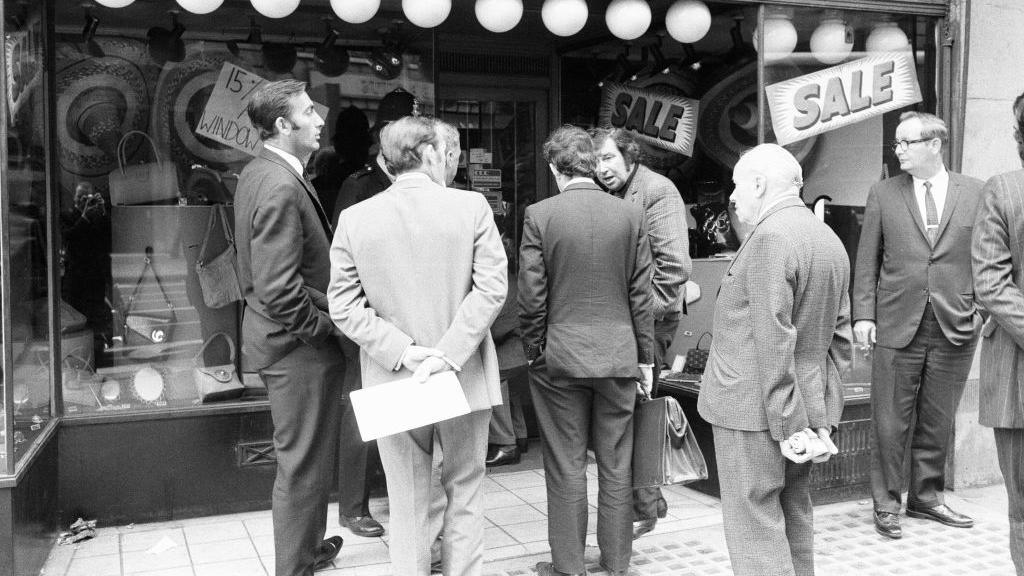
The tunnel started inside the SAC shop and ran underground to the bank
The heist was the inspiration for a 2008 film, The Bank Job. It includes a plotline in which the British Security Services want to retrieve some compromising photographs of Princess Margaret, allegedly held in a security box by Trinidadian militant gangster Michael X.
The obvious solution was to get a gang to tunnel into the vault.
The storyline boosted a rumour that appeared in newspapers, in which an anonymous "friend" said Reader was definitely involved in the heist and had told him he found photos showing a leading politician abusing children.
Reader apparently left the images "scattered on the floor of the vault" for the police to find.
There has been no evidence this was true.
Another rumour was that the government imposed a "D-notice" - now called a DSMA-notice - on the story.
This hinges on a lack of coverage of the story, with many claiming it disappeared from the news agenda.
A DSMA-notice is issued to prevent inadvertent public disclosure of information that would compromise UK military and intelligence operations.
It is not usually used to silence news stories about bank jobs that have already happened.
The lack of published stories, though, isn't quite true. Naturally, interest died down, but the raid was still being reported in national and regional papers throughout the decade.
The rumour may have started with radio ham Mr Rowlands, who said police had snatched a phone out of his grasp while he spoke to a newspaper about his part in the case.
He said the officer had told the editor he was not allowed to publish anything.
Years later, Mr Rowlands suggested the police were trying to cover up what appeared to be their own incompetence.
The only mystery that remains is what is in the 800 pages of sealed documents at the National Archives. They are due to be released in 47 years time.
So what did Lloyds Bank say about the whole event?
It advised customers to insure valuables kept in their safety boxes and denied any liability.
After all, it said: "It is a little unusual for raiders to come up through the floor."
Listen to the best of BBC Radio London on Sounds and follow BBC London on Facebook, external, X, external and Instagram, external. Send your story ideas to hello.bbclondon@bbc.co.uk, external
Related topics
- Published15 March 2019
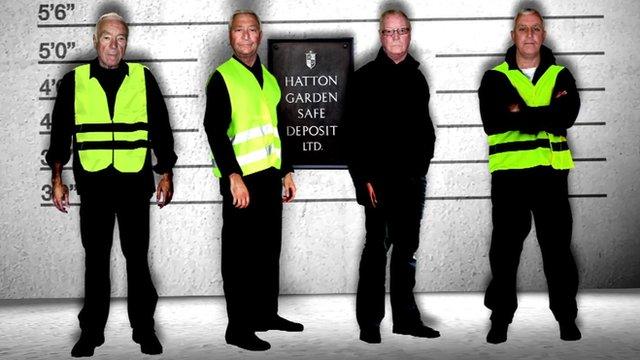
- Published13 February 2023
